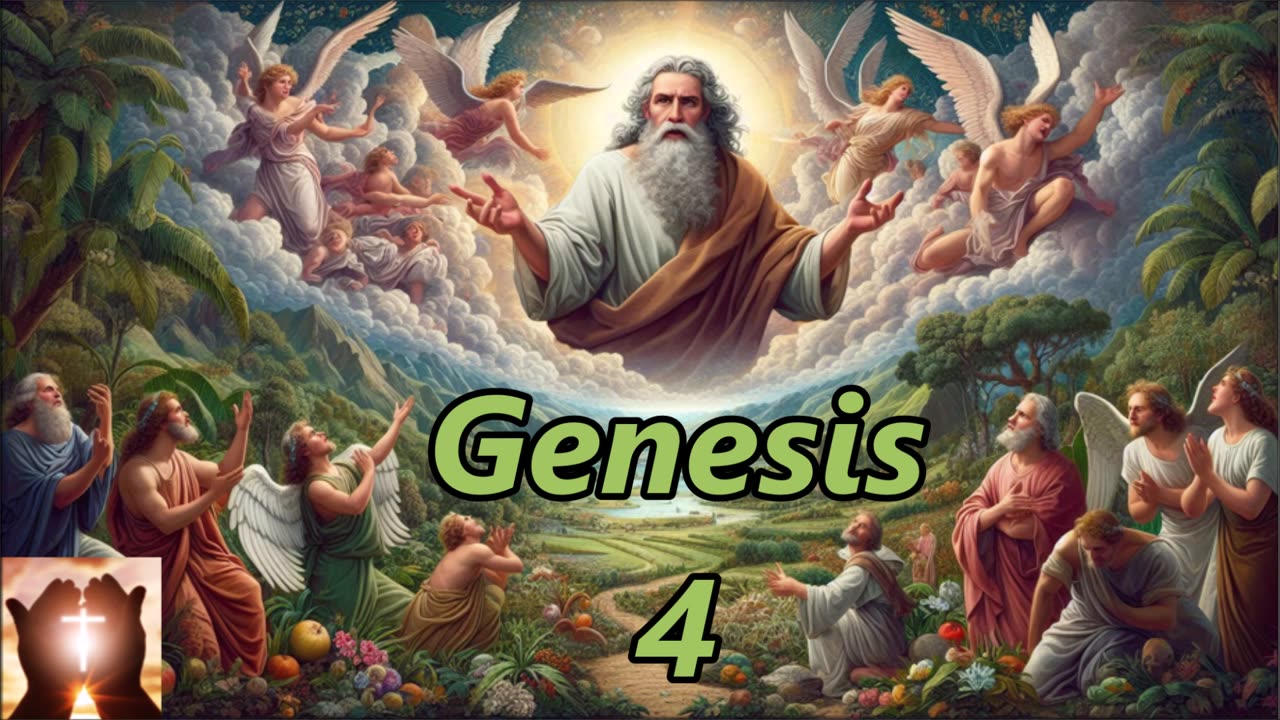Premium Only Content

Genesis 4
Verses 1-7: Cain and Abel’s offerings and Cain’s rejection.
Verses 8-16: The murder of Abel and Cain’s punishment.
Verses 17-24: Cain’s descendants and human culture.
Verses 25-26: Birth of Seth and the continuation of the godly line.
Summarized Study
1. Genesis 4:1-7 – Cain and Abel’s Offerings
Analysis: Eve gives birth to Cain and Abel. Cain, a farmer, offers produce, while Abel, a shepherd, offers the firstborn of his flock. God accepts Abel’s offering but rejects Cain’s, possibly due to lack of faith or quality (cf. Heb 11:4). God warns Cain about sin lurking, urging him to master it.
Application: God values the heart’s attitude in worship. We must offer our best to Him and control sinful impulses.
2. Genesis 4:8-16 – Murder of Abel and Cain’s Punishment
Analysis: Consumed by jealousy, Cain kills Abel. Confronted by God, he denies responsibility. God curses him, making him a fugitive and his work harder, but places a protective mark on Cain, showing grace.
Application: Uncontrolled sin leads to destruction. God’s grace offers protection but does not exempt from consequences.
3. Genesis 4:17-24 – Cain’s Descendants
Analysis: Cain builds a city and has descendants who develop culture (music, metallurgy) but also violence, exemplified by Lamech, who boasts of murders. This shows human progress mixed with moral corruption.
Application: Humanity can create, but without God, culture corrupts. We must align our works with divine values.
4. Genesis 4:25-26 – Birth of Seth
Analysis: Eve gives birth to Seth, seen as Abel’s replacement. Seth’s line begins to call on the Lord’s name, indicating a return to worship.
Application: God preserves a faithful line, offering hope amidst sin.
Theological Themes
Progression of Sin: Cain’s sin (jealousy, murder) is graver than Adam and Eve’s, showing sin’s escalation.
Personal Responsibility: God gives Cain the chance to choose good, highlighting free will.
God’s Grace: Despite sin, God protects Cain and raises Seth.
True Worship: An acceptable offering reflects faith and obedience.
Controversial Issues
Why was Cain’s offering rejected?: The text is unclear, but Hebrews 11:4 suggests Abel acted in faith, unlike Cain. It may involve attitude or offering quality.
Mark of Cain: Undescribed but protective, not a curse. Speculations (e.g., physical mark) lack textual basis.
Cain’s Wife: Likely a sister or close relative, common in early generations before Mosaic prohibitions (Lev 18).
Practical Applications
Sincere Worship: Offer to God with faith and a pure heart.
Control Sin: Resist destructive emotions like jealousy and anger.
Responsibility: Own your actions and seek reconciliation with God.
Hope: Trust that God preserves good even in corrupt times.
Reflection Questions
How do you handle feelings of jealousy or rejection?
What does Cain’s story teach about controlling sin?
How can we offer God acceptable worship?
-
 LIVE
LIVE
Wendy Bell Radio
5 hours agoGuns Don't Kill People
7,256 watching -
 LIVE
LIVE
Matt Kohrs
9 hours agoMarket Open: New Highs or Bust?! || Live Trading Futures & Options
605 watching -

Randi Hipper
51 minutes agoWALL STREET'S CRYPTO BET REVEALED! HINT: IT'S NOT BITCOIN!
2.18K1 -
 LIVE
LIVE
The Mike Schwartz Show
1 hour agoTHE MIKE SCHWARTZ SHOW with DR. MICHAEL J SCHWARTZ 08-28-2025
4,164 watching -
 LIVE
LIVE
LFA TV
3 hours agoLFA TV ALL DAY STREAM - THURSDAY 8/28/25
5,113 watching -
 2:04:35
2:04:35
Game On!
19 hours ago $3.07 earnedCollege Football Is BACK! Week 1 Preview!
36.2K2 -
 4:00:18
4:00:18
The Bubba Army
1 day agoMinneapolis Shooter Story Unfolds! - Bubba the Love Sponge® Show | 8/28/25
74.5K9 -
 LIVE
LIVE
JuicyJohns
2 hours ago $0.26 earned🟢#1 REBIRTH PLAYER 10.2+ KD🟢
25 watching -
 LIVE
LIVE
GritsGG
2 hours agoWin Streaking! Most Wins 3485+ 🧠
110 watching -
 16:58
16:58
marcushouse
15 hours ago $4.39 earnedSpaceX Starship Flight 10: What Really Happened! 🚀
47.7K13